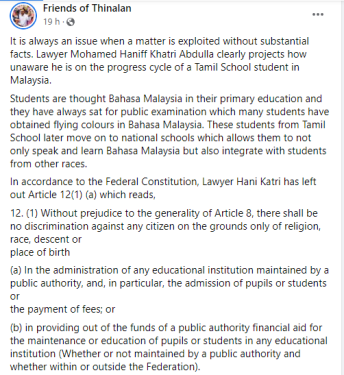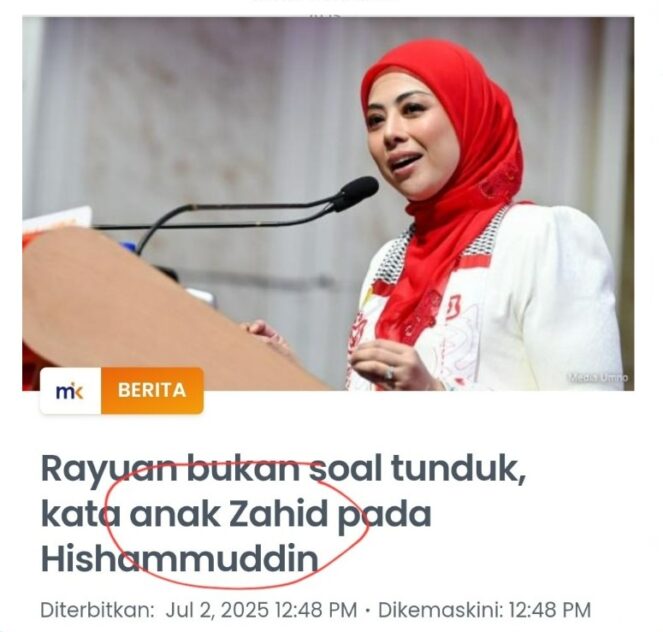LIVID over unfounded claims on vernacular schools, a MIC leader criticised lawyer Mohamed Haniff Khatri for saying those coming out from that system lacks proficiency in Bahasa Malaysia.
“Students are taught Bahasa Malaysia in their primary education and they have always sat for public examinations which many students passed with flying colours in Bahasa Malaysia.
“These students from Tamil schools later move on to national schools which allows them to not only speak and learn Bahasa Malaysia but also integrate with students from other races.
“It’s always an issue when a matter is exploited without substantial facts and Haniff clearly projects how unaware he is about Tamil schools,” its former youth chief R Thinalan said, in a statement.
Two days ago, Haniff, who was representing several Malay non-governmental organisations (NGO) in a suit against vernacular schools, argued that the existence of vernacular schools was detrimental to non-Bumiputeras.

He said that such schools reduced employment opportunities for non-Malays due to lack of proficiency in Bahasa Malaysia, as most public and private sector employers wanted someone who could speak and write in the national language.
“And the establishment of the vernacular schools runs contrary to Article 5(1) of the Federal Constitution, where no person shall be deprived of his life or personal liberty save in accordance with law,” Haniff was reported saying.
Unimpressed with Haniff’s argument, Thinalan said that the lawyer had missed another point under Article 12(1) of the Federal Constitution, where without prejudice to the generality of Article 8, there shall be no discrimination against any citizen on the grounds only of religion, race, descent or place of birth.


Constitution guarantees minority rights too
The article, the MIC leader explained, covers various rights under its subsection where it addresses the right to the administration of any educational institution maintained by a public authority, and, in particular, the admission of pupils or students or the payment of fees.
“it also covers other provisions such as in providing funds of a public authority, financial aid for the maintenance or education of pupils or students in any educational institution, whether or not it was maintained by a public authority and whether within or outside the Federation,” Thinalan added.
He remarked: “Apart from the Government, MIC have also joined in as defendants because the claims are baseless and were raised just to disrupt the harmony in the country.
“Such an act will never be welcomed and shall not be repeated in a nation working towards progress,” he noted.
The suit was filed in December 2019 by the Federation of Peninsular Malay Students (GPMS), the Islamic Education Development Council (Mappim) and the Confederation of Malaysian Writers Association (Gapena).
The NGOs are seeking a court declaration that the existence of vernacular schools goes against the provisions in the Federal Constitution as Article 152(1) defines Malay as the national language.
The other organisations listed as defendants are Chinese educationist groups Dong Zong and Jiao Zong, Persatuan Thamizhar Malaysia, Persatuan Tamilar Thurunal (Perak), Persatuan Gabungan Kebajikan Guru-Guru Bersara Sekolah Tamil, the Malaysian Chinese Language Council, Persatuan Malaysia Tamil Neri Kalagam, Gabungan Persatuan Bekas Pelajar Sekolah Tamil Malaysia and SMJK Chong Hwa.
Apart from the Government, four political parties – MIC, MCA, Gerakan and Parti Bumiputera Perkasa Malaysia have also joined in as defendants. – Nov 25, 2021.









